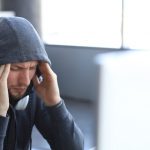Three-Quarters of Americans Are Lonely
A new poll finds 75% of American adults feel a sense of loneliness—an increase from the 72% of people who reported loneliness in a 2016 poll. Both surveys were conducted by The Harris Poll on behalf of the American Osteopathic Association.
These surveys are concerning because loneliness has a significant impact on overall wellbeing, says Robert Greer, DO, an osteopathic family physician in West Palm Beach, Florida.
“Feeling isolated can alter a patient’s ability to comply with their health care treatment, make healthy lifestyle choices and engage meaningfully with society,” he says. “Human connection, whether online or in-person, bolsters health and wellness.”
Can social media relieve loneliness?
In the fall of 2016, Americans were in the midst of a polarizing presidential election. Social media channels were flooded with opinions and questionable news articles that caused conflict in families and communities. Since then, many Americans have adjusted their use of social media sites to preserve their emotional health, according to Dr. Greer, but reduced social media use may be increasing feelings of loneliness for some people.
“Social media provides an opportunity to find a support network, even when it’s not in your immediate, physical environment,” says Dr. Greer. “If you are not using social media for social engagement, then you are more likely to feel left out.”
Social media has diversified and expanded in past years
At 38, Dr. Greer is a millennial who considers platforms like Meetup, Fortnite and Nextdoor to be an important evolution of traditional social media channels like Facebook and Twitter. Tapping into tools that enable shared connections through a digital space can decrease feelings of isolation, he suggests.
Dr. Greer notes that many of his patients now participate in esports, or online gaming competitions, instead of outdoor sports like soccer. As a physician, he is disappointed by the loss of physical activity among his patients but says the games cultivate useful skills that can help adolescents and adults socially and mentally. It can also build a network of friends from different cultures and countries.
“It’s a little unusual for a physician to prescribe social media, but we must think outside the box to keep the loneliness epidemic from spreading,” says Dr. Greer. “Three-quarters of Americans are lonely. That’s taking a real toll on our country’s emotional health.”
Seniors citizens have the most to gain
The elderly are living longer and often face additional physical challenges that impede social activities. Teaching seniors to play games online, find appropriate Facebook Groups, or even navigate dating sites, can help them connect in new ways, says Jennifer Caudle, DO, associate professor of family medicine at Rowan University School of Osteopathic Medicine.
“I partner with my older patients to evaluate their emotional state and its impact on their physical wellbeing,” says Dr. Caudle. “For those who suffer from issues including anxiety, immobility or isolation, an online community can be life-changing.”
Engagement in online communities will play out differently by generation, interest and technological capability, but can add rich meaning to real life. Seniors who can successfully navigate social networks stand to gain the most, says Dr. Caudle.

